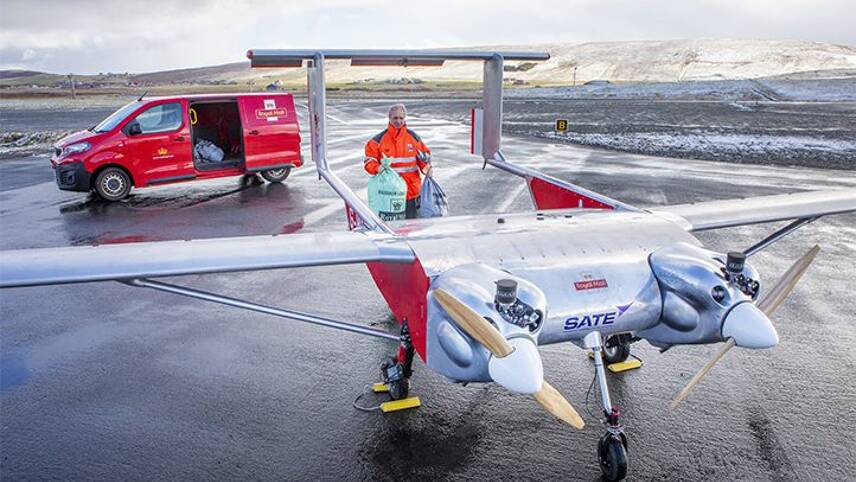Register for free and continue reading
Join our growing army of changemakers and get unlimited access to our premium content

The plan is subject to Civil Aviation Authority (CAA) approval, as part of a new partnership with Windracers, the logistics drone company
The company has today (12 May) unveiled a plan to create more than 50 new postal routes delivered by drones in the next three years.
Royal Mail believes that the uncrewed drones will help reduce carbon emissions while also providing more reliable services to remote communities. The drones would replace the need, in some cases, for ferry or aircraft shipments that can be delayed by bad weather.
As such, Royal Mail is currently targeting coastal and island routes, including the Isles of Scilly, Shetland Islands, Orkney Islands and the Hebrides.
Royal Mail’s chief executive Simon Thompson said: “On time delivery regardless of our customers location or the weather, whilst protecting our environment is our goal. Even though we go everywhere, Royal Mail already has the lowest CO2 emissions per parcel delivered, this initiative will help reduce our emissions even further.”
The plan will see Royal Mail secure more than 50 drone routes and 200 drones over the next three years. It builds into a long-term ambition to deploy more than 500 drones across the UK.
The current initiative is based off of trails over the last 18 months, which saw drones piloted on the Isle of Mull in Scotland, on the Isles of Scilly off the Cornish coast and between Kirkwall and North Ronaldsay, on the Orkney Islands.
The plan is subject to Civil Aviation Authority (CAA) approval, as part of a new partnership with Windracers, the logistics drone company.
Transport tuning
The drone rollout is the latest initiative from Royal Mail aimed at reducing transport emissions.
Last year, the company announced that all of its company cars will be electric vehicles (EVs) by 2030, with salary sacrifice schemes and mileage reimbursement packages set to be adjusted to only account for low-carbon forms of transport.
By 2025, only EVs will be available to order for company cars and by 2022, colleagues needing access to cars will be eligible for a “zero tailpipe emissions company car scheme”. Postmen and women will be able to access EVs through the scheme and a salary sacrifice initiative called MyDrive.
More broadly, Royal Mail announced plans to add an additional 3,000 low-emission delivery vans to its fleet. Royal Mail currently operates some 300 EVs, so the vision marks a ten-fold increase in the size of its electric fleet.
Royal Mail is also exploring alternative fuels as well as EVs. In May 2021, it added 29 40-tonne biogas-powered trucks to its fleet. The firm is aiming to convert entirely to EVs and alternative fuels, phasing out petrol and diesel entirely, but has not set a target date.
Royal Mail is also a member of The Climate Group’s EV100 initiative, which aims to make electric vehicles (EVs) “the new normal” by 2030.


Please login or Register to leave a comment.